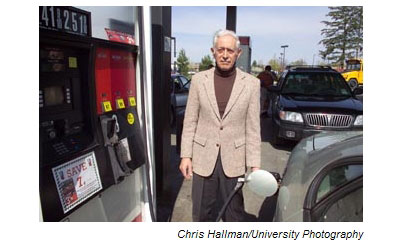Biofuels: Cornell study v. US Dept. of Energy study
Posted By RichC on July 20, 2005
David Pimentel, professor of ecology and agriculture at Cornell University claims there is no energy benefit to using plant biomass for liquid fuel.

“The United States desperately needs a liquid fuel replacement for oil in the near future but producing ethanol or biodiesel from plant biomass is going down the wrong road, because you use more energy to produce these fuels than you get out from the combustion of these products,” he said.
Point:
Pimentel and Tad W. Patzek, professor of civil and environmental engineering at Berkeley, conducted a study of the energy input-yield ratios of producing ethanol from corn, switch grass and wood biomass as well as for producing biodiesel from soybean and sunflower plants. They assessed inputs such as energy used in production of pesticides and fertilisers, running farm machinery and irrigating, grinding and transporting the crop, and in fermenting/distilling the ethanol from the water mix.
Their study found that, for ethanol production, corn needed 29% more fossil energy than the fuel produced, that switch grass needed 45% more and that wood biomass required 57% more than it produced. For biodiesel production they found that soybean plants needed 27% more energy than it produced and that sunflower plants needed 118% more.
Counterpoint:
The Cornell study actually has 1-1/2 pages that details how it arrived at its opinion on ‘soy’ based biodiesel’s efficiency and the media articles even less; the study used data from 1990 agricultural information and completely ignored the value of the soymeal, glycerin, etc. (BTW: note that Dr. Pimentel and Patzek head the UC Oil Consortium at Berkeley)
On the other hand, The US Department of Energy’s study, using recent agricultural data from the US Department of Agriculture (2002) concludes something far different from the heavily publicized Cornell story. Their report concluded that for every one unit of fossil energy used in this entire production cycle, 3.2 unit of energy are gained when the fuel is burned, or a positive energy balance of 320%. This study started with bare soil and took into account all the energy inputs associated with growing and harvesting soybeans: transporting and processing the soybeans into oil and meal, transportation and production of the soybean oil into biodiesel, and transportation of the biodiesel to the end user.
This 286 page PDF study can be found at National Renewable Energy Laboratory.
It is disappointing that the Pimentel study gets so much press when a far more detailed report, using more recent data, is available to the media. Just like the NYTimes writer interviewing select hybrid owners and using only comments that supported the story’s objective, I believe that most of the 200+ recent releases of the Cornell study have mislead their viewers and readers too.
Comments